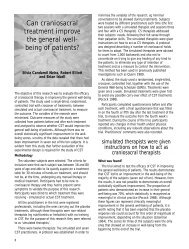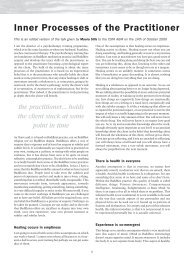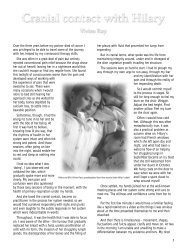Issue 28.pmd - The Craniosacral Therapy Association of the UK
Issue 28.pmd - The Craniosacral Therapy Association of the UK
Issue 28.pmd - The Craniosacral Therapy Association of the UK
Create successful ePaper yourself
Turn your PDF publications into a flip-book with our unique Google optimized e-Paper software.
Winter 2003<br />
Silence<br />
Julian Cowan Hill<br />
In my own treatments, when I released shock or was unwound,<br />
my sympa<strong>the</strong>tic nervous system became highly activated and<br />
my tinnitus went berserk. An eruption <strong>of</strong> change sent reactions<br />
cascading through my body, and sometimes took weeks to settle.<br />
But <strong>the</strong>n, I was a CST student and I knew what a healing crisis<br />
was, and could put it down to being part <strong>of</strong> <strong>the</strong> process. I had<br />
plenty <strong>of</strong> people to ask why I was feeling <strong>the</strong> way I was.<br />
However, someone who is deeply disturbed by tinnitus may<br />
be alone, with little support, and will <strong>of</strong>ten find releases and<br />
change overwhelming.<br />
Recovery needs much change in <strong>the</strong> system, and yet it is<br />
precisely change that is likely to activate <strong>the</strong> system and disturb<br />
<strong>the</strong> tinnitus. Here is <strong>the</strong> tinnitus paradox.<br />
As a practitioner I quickly stopped working with tissues and<br />
all <strong>the</strong>ir emotional issues with unwinding as I found it far too<br />
activating and counter-productive. Ra<strong>the</strong>r than focusing on<br />
<strong>the</strong> swirling whirlpools, electrical storms, hot buzzy feelings<br />
or cold emptiness, I found that looking for <strong>the</strong> deeper stillness<br />
from <strong>the</strong> long-tide helped make changes less activating and<br />
more manageable.<br />
When someone comes to me with devastating tinnitus, I<br />
actually feel it is unethical to get involved in highly activating<br />
processes: working with <strong>the</strong> CRI, unwinding, talking about<br />
overwhelming issues, etc. when <strong>the</strong>y are in such a state <strong>of</strong><br />
nervous overwhelm. You need to be in <strong>the</strong> right place on that<br />
tightrope, not too close, with plenty <strong>of</strong> space all around it, and<br />
with all your own support to balance you.<br />
As most people with tinnitus have long since forgotten how to<br />
be calm, and how to switch <strong>of</strong>f, <strong>the</strong> best thing we can do is help<br />
<strong>the</strong>m rediscover this at <strong>the</strong> deepest possible level, in <strong>the</strong> longtide<br />
or below. I find tuning in to a person’s craniosacral motion<br />
or CRI <strong>of</strong>ten makes tinnitus worse, especially if you are sitting<br />
<strong>the</strong>re, holding into patterns and looking for releases.<br />
It is <strong>the</strong> long-term improvements that count and I encourage<br />
clients not to cling on to immediate improvements or changes<br />
in <strong>the</strong>ir tinnitus. Things will probably go up and down in <strong>the</strong><br />
short-term and start to improve overall very gradually.<br />
<strong>The</strong> first stage in getting over tinnitus is becoming less irritated<br />
by it. If <strong>the</strong> noise seems quieter, that’s great, but when it stops<br />
being so annoying this is a sure step to a more long-term<br />
improvement.<br />
<strong>The</strong> ‘tinnitus personality’<br />
Clear patterns emerge when you treat many people with<br />
tinnitus. <strong>The</strong> most startling for me was that less than 20% <strong>of</strong><br />
those who responded to an article I wrote actually came back<br />
for a second session. O<strong>the</strong>r <strong>the</strong>rapists have also found that<br />
many <strong>of</strong> <strong>the</strong>ir clients with tinnitus didn’t follow through with<br />
a course <strong>of</strong> treatment.<br />
I want to explain some <strong>of</strong> <strong>the</strong> common patterns that I have<br />
found in many <strong>of</strong> <strong>the</strong> people I have seen.<br />
If helping tinnitus is all about letting go, <strong>the</strong> bad news is that<br />
letting go does not come easily to people with tinnitus. <strong>The</strong><br />
body tends to hold tension/emotional conflict deep inside and<br />
so a lot <strong>of</strong> control is needed to function normally. This in turn<br />
leads to being very cerebral and horribly out <strong>of</strong> touch with<br />
what is going on below <strong>the</strong> neck.<br />
Typically, people with tinnitus live in a permanent state <strong>of</strong><br />
sympa<strong>the</strong>tic arousal, and <strong>the</strong>refore tend to be very driven,<br />
reactive and restless. <strong>The</strong>y spend most <strong>of</strong> <strong>the</strong>ir lives racing<br />
around in <strong>the</strong>ir heads and <strong>of</strong>ten don’t want to feel how locked<br />
up or blocked <strong>the</strong>y are. Even more challenging is <strong>the</strong> number<br />
<strong>of</strong> people deeply in parasympa<strong>the</strong>tic shock where <strong>the</strong>y literally<br />
cannot feel much <strong>of</strong> <strong>the</strong>ir body at all.<br />
I’ll never forget taking <strong>the</strong> case history <strong>of</strong> a multi-millionaire.<br />
He had narrowly escaped three serious car crashes. He was<br />
chairman <strong>of</strong> a large international corporation. In his spare<br />
time he dabbled with some companies he owned for fun. Every<br />
morning he took many drugs. He’d remarried so many times<br />
a whole page probably carried his name in <strong>the</strong> phone book.<br />
‘What do you do to relax,’ I asked him, curiously.<br />
‘I sleep on <strong>the</strong> plane,’ he replied with a tight smile. I didn’t<br />
pursue that line <strong>of</strong> questioning any more. Suddenly, without<br />
any warning, his head went into a frenzy <strong>of</strong> shaking.<br />
‘Are you alright’ I asked.<br />
‘Oh fine thanks,’ he replied. He held his arms down to stop<br />
<strong>the</strong>m from trembling visibly.<br />
<strong>The</strong> more you get<br />
irritated, <strong>the</strong> louder<br />
it seems<br />
I tried to get him to explain how his body felt, but he couldn’t.<br />
I asked him if he could feel <strong>the</strong> couch, but he didn’t really<br />
understand what I meant. When I took up contact, I don’t<br />
think he was anywhere near his body. Even if I had been sitting<br />
on an extra-comfortable practitioner’s fulcrum a million miles<br />
away, I don’t think we would have established much contact.<br />
This is an extreme example, but most people with tinnitus I<br />
have met have been live wires, who are disconnected from<br />
<strong>the</strong>ir bodies. <strong>The</strong>y seem incapable <strong>of</strong> switching <strong>of</strong>f and getting<br />
out <strong>of</strong> <strong>the</strong>ir heads. Even a seemingly placid gardener will spend<br />
all day in <strong>the</strong> garden worrying about where to put <strong>the</strong>ir<br />
magnolias tomorrow.<br />
Symptoms appear in very clear patterns too, <strong>of</strong>ten surfacing a<br />
few months after a divorce, moving house, bereavement, an<br />
operation, being promoted etc. Anything that overstimulates<br />
you over a prolonged period <strong>of</strong> time is enough to trigger<br />
tinnitus.<br />
5





